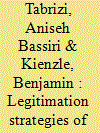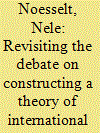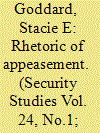|
|
|
Sort Order |
|
|
|
Items / Page
|
|
|
|
|
|
|
| Srl | Item |
| 1 |
ID:
168559


|
|
|
|
|
| Summary/Abstract |
How do hierarchical cores or metropoles legitimate their influence or rule? How do their approaches to legitimation inform resistance? This theory note rethinks how legitimation operates in hierarchies, with a focus on variation in cores’ legitimation strategies. I argue that varying claims to hierarchical legitimacy shape both action at the core and resistance at the periphery. I develop a four-part typology of legitimation strategies, differentiated along two axes. On the first, cores may be universalist, recognizing no legitimate equals, or competitive, recognizing other cores as peer rivals. On the second, they may chiefly innovate legitimacy claims internally, drawing them from their own political traditions, or externally, borrowing the claims of others. These strategies shape available options for revisionism by rivals and resistance by hierarchical subordinates. I illustrate with historical examples.
|
|
|
|
|
|
|
|
|
|
|
|
|
|
|
|
| 2 |
ID:
174712


|
|
|
|
|
| Summary/Abstract |
The European Union has seen the rise of informal groups of states as an increasingly important governance mechanism within its formal structures. Such groups can make decision-making processes more efficient, but they also suffer from a substantial lack of legitimacy in the eyes of the non-members. In this article, we examine how informal groups overcome this fundamental dilemma between efficiency and legitimacy and sustain themselves at the forefront of important policy areas. To this end, we trace the development of what we argue to be a particularly useful case: the E3 directoire in the nuclear negotiations with Iran. The empirical results point to new insights into how directoires – and informal groups in general – can use different types of legitimation strategies to gain and maintain legitimacy. More specifically, the E3 implemented three successive legitimation strategies – detachment, co-optation and integration – using different types of legitimacy sources, in particular problem-solving, institutional adjustments and fostering institutional and policy congruence.
|
|
|
|
|
|
|
|
|
|
|
|
|
|
|
|
| 3 |
ID:
192081


|
|
|
|
|
| Summary/Abstract |
This article examines how middle powers develop their strategies for influencing other members of international society. This research is important as the literature on middle powers assumes that they possess significant persuasive power, yet does not explain how such persuasive capabilities are developed. This research applies the legitimation strategies framework to the case of Indonesia’s promotion of the ASEAN Outlook on the Indo-Pacific (AOIP). It argues that Indonesia sought to convince ASEAN countries, China, and the United States of the value of its preferred vision of the Indo-Pacific by articulating multiple rhetorics that appealed to the pre-existing interests and beliefs of the target audience. Before the ASEAN audience, Indonesia claimed that its vision was compatible with the principles of non-interference and regional economic development. To influence the United States, Indonesia held that its regional vision would support a rule-based order. To convince China, Indonesia maintained that its vision would create an inclusive regional order. This article, therefore, shows that middle powers seek to develop their persuasive capabilities through enunciations that appeal to the beliefs and interests of multiple audiences simultaneously.
|
|
|
|
|
|
|
|
|
|
|
|
|
|
|
|
| 4 |
ID:
145514


|
|
|
|
|
| Summary/Abstract |
The article presents a top-down approach to the study of the empirical legitimacy of international institutions. It starts from the observation that international institutions’ representatives are engaged in various strategies aimed at cultivating generalised support. The article asserts that such strategies should be taken into account to gain deeper insights into the legitimation process of international institutions. To systematise these legitimation efforts and facilitate their empirical analysis, the article introduces the concept of legitimation strategies, which are defined as goal-oriented activities employed to establish and maintain a reliable basis of diffuse support. An analytical differentiation between three types of legitimation strategies is introduced depending on the addressees of legitimation strategies, that is, member state governments, international institutions’ staff, and the wider public. The applicability of the concept and the relevance of legitimation strategies for international institutions’ communication, behaviour, and institutional design is demonstrated by an empirical analysis of the G8’s and the IMF’s reaction to legitimation crises in the recent past of both institutions. In addition, the case studies suggest that a balanced set of legitimation strategies that takes into account the legitimacy concerns of all three constituencies is more likely to be successful in improving legitimacy perceptions.
|
|
|
|
|
|
|
|
|
|
|
|
|
|
|
|
| 5 |
ID:
139561


|
|
|
|
|
| Summary/Abstract |
After decades of policy learning and adoption of “Western” theories of international politics, the Chinese academic community has (re-)turned to the construction of a “Chinese” theory framework. This article examines the recent academic debates on theory with “Chinese characteristics” and sheds light on their historical and philosophical foundations. It argues that the search for a “Chinese” paradigm of international relations theory is part of China's quest for national identity and global status. As can be concluded from the analysis of these debates, “Chinese” theories of international politics are expected to fulfil two general functions – to safeguard China's national interests and to legitimize the one-party system.
|
|
|
|
|
|
|
|
|
|
|
|
|
|
|
|
| 6 |
ID:
138852


|
|
|
|
|
| Summary/Abstract |
Few grand strategies have been more scrutinized than Britain’s decision to appease Nazi Germany. From 1933 to 1938, Britain eschewed confrontation and attempted to settle German demands. However in the five months following the negotiations at Munich, the British abandoned appeasement and embraced a policy of confronting the German state. The roots of both appeasement and confrontation can be found in Germany’s legitimation strategies. Until the Munich crisis, Adolf Hitler justified Germany’s aims with appeals to collective security, equality, and self-determination—norms central to the European system established by the Treaty of Versailles. After Munich, in contrast, German politicians abandoned these legitimation strategies, arguing instead that expansion was justified as a matter of German might, and not international rights. As Britain came to see German demands as illegitimate, so too did they decide this revisionist state was insatiable, impervious to negotiation, and responsive only to the language of force.
|
|
|
|
|
|
|
|
|
|
|
|
|
|
|
|
|
|
|
|
|